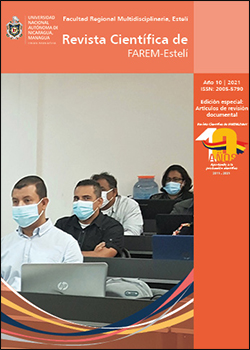Importance of significative learning in the construction of the knowledge
DOI:
https://doi.org/10.5377/farem.v0i0.11608Keywords:
Knowledge Acquisition, significative learning, constructivism, approach, pedagogy, bibliographic reviewAbstract
This following article presents a bibliographic review on significative learning proposed by David Ausubel, describing it’s meaning, nature, and characteristic, with the objective of analyzing its value in higher education. Likewise, the characteristics of potentially significant learning material, types of significative learning, and the acquisition of knowledge are explained. It is based on the premise that the significative learning arises when the student, as the constructor of self-knowledge, relates the concepts to be learned and gives them a meaning based on the conceptual structure the student already possesses. In this way, the student construct new knowledge by relating new concepts to the experience they already have. This article approaches in a particular way the relevance of this type of learning applied to higher education, specifically to UNAN-Managua. To this end, documentary research was applied, as a qualitative, exploratory, and analytical research technique for the collection of relevant information on the importance of significative learning in the construction of knowledge, thus, information was collected, and selected by reading documents, books, journal, newspaper, bibliographies, etc. It was concluded that significative learning is a challenge and an opportunity for the construction of the new knowledge, which implies the need for structural changes in higher education in order to qualify future professionals with a critical, proactive and reflective attitude
Downloads
References
Arias, W. (2001). Sócrates el primer constructivista. Paradigma educativo, 3(5), 11-13.
Asadovay, D., & Morocho, L. (2015). La activación de los conocimientos previos para lograr un aprendizaje en niños de E.G.B. Cuenca, Ecuador: ( Tesis de Grado) Universidad de Cuenca, Ecuador.
Ausubel. (1980). Psicología Educativa. Un punto de vista cognoscitivo. México: 4a. Ed. Trillas disponible en: http://www.educainformatica.com.ar/docentes/tuarticulo/educacion/
Ausubel, D. (2000). Adquisición y retención del conocimiento. Una perspectiva cognitiva. Barcelona: Paidós.
Ausubel, Novack & Hanesian. (1983). Psicología Educativa. Un punto de vista cognoscitivo. México: Ed. Trillas/ disponible en: http://www.educainformatica.com.ar/docentes/tuarticulo/educacion/
Baro, A. (2011). Metodologías activas y aprendizaje por descubrimiento. Revista Digital Innovación y Experiencias Educativas, 40, 1-11.
Bruner. (1968). El proceso de la educación. México: Unión tipográfica Editorial Hispano Americana.
De Zubiría, J. (2006). Los modelos pedagógicos. Hacia una pedagogía dialogante (2ª ed.). Bogota: Magisterio.
De Soussa Santos, B. (2007). La Universidad en el Siglo XXI / Para una reforma democrática y emancipatoria de la Universidad. La Paz, Bolivia: CIDES-UMSA, ASDI y Plural editores,4a. ed.
Fernández, N. (2006). Estrategias de enseñanza para favorecer el aprendizaje significativo. cognición, 5, 12-18.
Freire, P. (1980). Pedagogía del Oprimido. Bogotá, Colombia: Siglo XXI editores, 24a. ed.
Montilla, R., & Arrieta, X. (2015). Secuencia didáctica para el aprendizaje significativo del análisis volumétrico. Omnia / Universidad del Zulia, Maracaibo, Venezuela, vol. 21, núm. 1, enero-abril, pp. 66-79. Disponible en: http://www.redalyc.org/articulo.oa?id=73742121006
Moreira, M. (1997). Aprendizaje significativo: un concepto subyacente. Burgos: España.
Moreira, M. (2000). Aprendizaje significativo. teoría y práctica. Madrid: Ed. Visor.
Moreira, M. (2017). Aprendizaje significativo como un referente para la organización de la enseñanza. Archivo de las ciencias de la educación, Vo. 11 No. 12, e29 / Disponible en: http://www.memoria.fahce.unlp.edu.ar/art_revistas/pr.8290/pr.8290.pdf.
Novak, J. (1981). Una teoría de la educación. Sao Paulo, Brasil: Pionera.
Riesgo, M., & Díaz, M. (2013). Reinventando la rueda: una experiencia de aprendizaje por descubrimiento enla asignatura de sistemas operativos. Revisión, 6(1), 12-19.
UNAN-Managua. (2011). Modelo educativo, normativa y metodología para la planificación curricular.
Vigotsky, L. (1978). Pensamiento y Lenguaje. Barcelona, España: Ediciones Fausto.
Published
Issue
Section
License
Copyright (c) 2021 Revista Científica de FAREM-Esteli

This work is licensed under a Creative Commons Attribution-NonCommercial-ShareAlike 4.0 International License.



